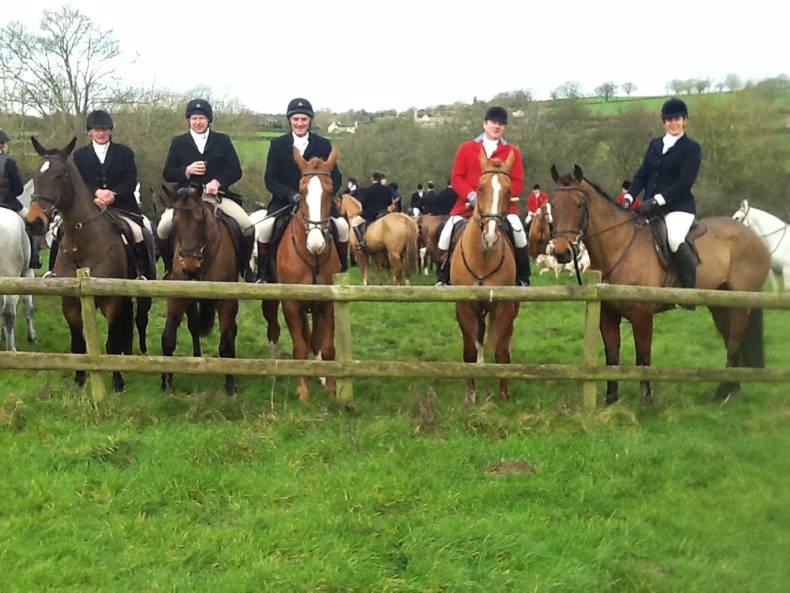On a family dairy farm, in the current financial crisis, it is very easy to reduce labour costs and increase the workload for those remaining, to a point where taking time off is not allowed. This results in fatigue and the inability to make correct decisions.
Fortunately, earlier in the spring, we had over a party of Cork farmers who came to inspect grass growing in North Wiltshire. Unfortunately, one of them had the opportunity to inspect the grass at closer quarters than he would have wished (see photo above and work it out).
They insisted that I returned to Ireland for the RDS. Here I am now, on my way back home, having been treated to wonderful Irish hospitality and generosity, realising that time away like this puts your head back in gear and demolishes the problems back home to a surmountable size.
Nations cup
Having been collected from the airport and transported to the IFJ headquarters where we met the editor, it soon became obvious that his farming connections are a large part of what makes the Irish Farmers Journal so successful.
We then attended the RDS, and met many old friends and made new and saw the cream of Irish horses and horsemanship. The noise and atmosphere in the Long Bar has to be experienced to be appreciated, particularly during the Nations Cup, when the cheers of potential success lifted the roof, to the final horse sitting down at the last fence, when Irish pride and anticipation drained from the roof to the cellar steps. The attendance at the bar was unabated, commiserating what might have been.
Blocked drain
Back home, Monday morning, reality struck. A blocked drain in the milking parlour. Eight hours going through ten inches of reinforced concrete, convinces me that when the new milking parlour eventually happens, the first job will be to see that the drains are correct.
Two years ago, we blanket sprayed the whole farm for docks, it worked very well, and last year we were relatively clear, but this year they are back with a vengeance. We had forty acres sprayed while we away and it seems to be working, but there's more to do yet.
Every year as we near August, I continually ponder what will happen if we get a drought. Should I stop fertilising, since there's no rain to wash the fertiliser in, and there's no rain to make the grass grow, or should I continue fertilising to accelerate what little growth there is?
Answers on a postcard please.
Read more
Read more from Joe
On a family dairy farm, in the current financial crisis, it is very easy to reduce labour costs and increase the workload for those remaining, to a point where taking time off is not allowed. This results in fatigue and the inability to make correct decisions.
Fortunately, earlier in the spring, we had over a party of Cork farmers who came to inspect grass growing in North Wiltshire. Unfortunately, one of them had the opportunity to inspect the grass at closer quarters than he would have wished (see photo above and work it out).
They insisted that I returned to Ireland for the RDS. Here I am now, on my way back home, having been treated to wonderful Irish hospitality and generosity, realising that time away like this puts your head back in gear and demolishes the problems back home to a surmountable size.
Nations cup
Having been collected from the airport and transported to the IFJ headquarters where we met the editor, it soon became obvious that his farming connections are a large part of what makes the Irish Farmers Journal so successful.
We then attended the RDS, and met many old friends and made new and saw the cream of Irish horses and horsemanship. The noise and atmosphere in the Long Bar has to be experienced to be appreciated, particularly during the Nations Cup, when the cheers of potential success lifted the roof, to the final horse sitting down at the last fence, when Irish pride and anticipation drained from the roof to the cellar steps. The attendance at the bar was unabated, commiserating what might have been.
Blocked drain
Back home, Monday morning, reality struck. A blocked drain in the milking parlour. Eight hours going through ten inches of reinforced concrete, convinces me that when the new milking parlour eventually happens, the first job will be to see that the drains are correct.
Two years ago, we blanket sprayed the whole farm for docks, it worked very well, and last year we were relatively clear, but this year they are back with a vengeance. We had forty acres sprayed while we away and it seems to be working, but there's more to do yet.
Every year as we near August, I continually ponder what will happen if we get a drought. Should I stop fertilising, since there's no rain to wash the fertiliser in, and there's no rain to make the grass grow, or should I continue fertilising to accelerate what little growth there is?
Answers on a postcard please.
Read more
Read more from Joe






 This is a subscriber-only article
This is a subscriber-only article










SHARING OPTIONS: